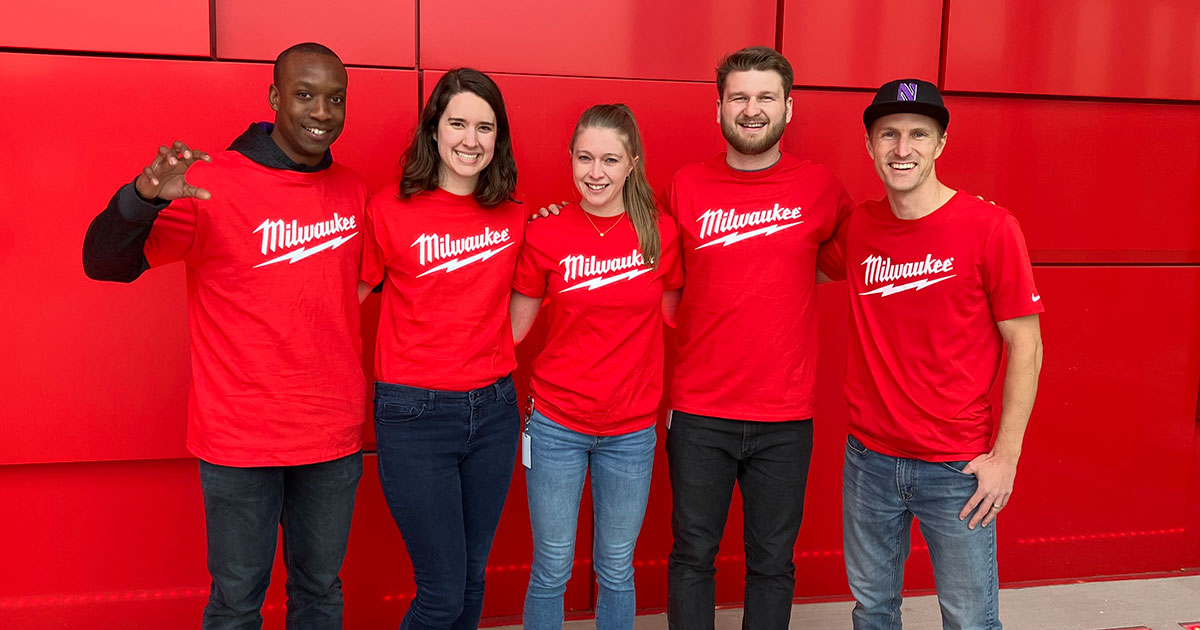The Milwaukee Tool Five
Five EDI graduates work together at Milwaukee Tool, helping create innovative tools and worksite solutions while implementing the human-centered design skills they honed at Northwestern.

Brad Gill (EDI '14) was introduced to Milwaukee Tool's Sawzall® reciprocating saw in elementary school. His father was a general contractor and frequently took him to job sites. The image of his dad using the handheld saw for demolition remains fresh in Gill's mind.
For Chris Spaulding (EDI '19), his first memory of Milwaukee Tool came from helping to build homes in New Orleans. “The service group I was a part of had several large bags of tools donated from Milwaukee Tool, and that’s what we would use for the entire week,” Spaulding said. “It didn’t take long for me to start loving the tools as I learned more about construction work, which led me to inquire more about the company, thus starting my interest in working there.”
Today Spaulding and Gill both work at Milwaukee Tool, along with three other recent graduates from Northwestern's Engineering Design Innovation (EDI) program. Gill is a front-end innovation lead for the company’s lighting and lifestyle business unit, while Spaulding is a front-end innovation engineer.
It is not a coincidence that this one company is now home to five EDI alumni.
“The EDI program and Milwaukee Tool share a common thread with a passion for the users,” said Julia Savich (EDI '17), who is an associate front-end innovation lead and joined the company shortly after graduating from EDI. “The front-end innovation process we follow at Milwaukee Tool is a more in-depth version of the product development process EDI students learn.”
That process is called human-centered design, which focuses heavily on user research to help ensure that what’s produced is as helpful as can be.
"Not many companies are set up in a way that clearly prioritizes their users," Gill said. "One thing that's clear is that our teams, especially in the concept and front-end innovation departments, spend time in the trenches with our users. EDI teaches you how valuable users are in the design process, and to work for a company that has that embedded in the culture is incredibly meaningful."
Ellen Owens (EDI '18) said that when she was in EDI, she didn't know much about Milwaukee Tool other than they made power tools. What sold her on the company was a testimonial from Savich, who returned to EDI to recruit talent from Owens' class. Savich walked Owens through the company's front-end innovation department and how they worked to uncover opportunities and develop new product solutions.
Owens immediately saw the similarities between Milwaukee Tool and EDI, and became interested in working for the company.
"Milwaukee Tool's user-centered focus and design process are so similar to what we were taught in EDI, it makes for an easier transition into the professional world," said Owens, who has worked as a front-end innovation engineer since 2019. "Milwaukee Tool really values user feedback and puts their users at the center of their development process."
Jesse Brown (EDI ‘22) is the latest EDI graduate to join Milwaukee Tool. He started in June as a mechanical design engineer in the hand tools, safety, and storage business unit.
“EDI is a great program to learn a broad range of topics, all related to human-centered design,” Brown said. “Many things that we have learned in EDI about product design can be seen being practiced here at Milwaukee Tool.”
Spaulding agreed. “We are constant advocates for the user, taking observations and their feedback from in-field research sessions to inform the designs we make,” Spaulding said. “That feedback translates through from our group on the front end all the way to the end design out of new product development that then ends up in the hands of the users that helped us design it.”

